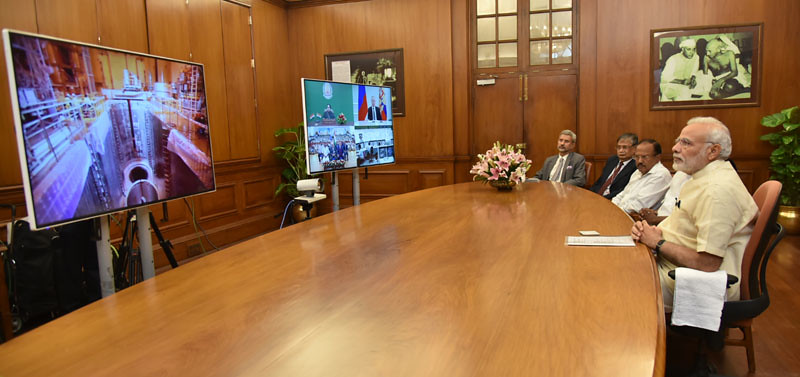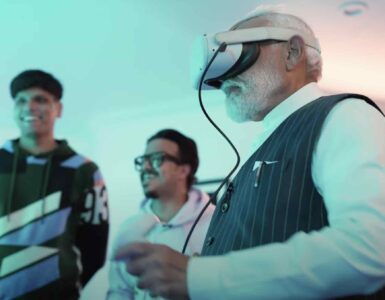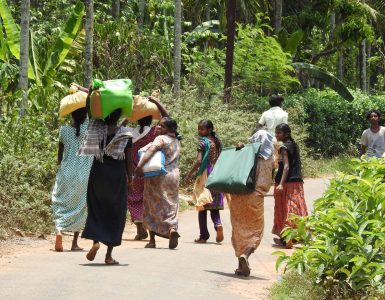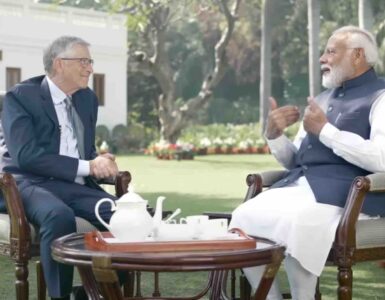India Prime Minister Narendra Modi made some extremely pertinent points amid the corona pandemic on the social media site LinkedIn (owned by Microsoft). The news channels only took note of the comments he made on religion and unity, in the hype there was an important reference that the media missed out on.
In the midst of a global lockdown, we may say that economics has come to a complete standstill, but thankfully No and for that, we must express our gratitude for the role of technology. Poor people are getting money in their bank accounts, many kids are getting access to education, and families are getting food supplies which means the supply chain is working – all this is possible through technology.
None of us know what happened during the Spanish flu pandemic in 1917-18 and how the business activities were carried out at that time or how they recovered, but for sure there was no technology. While this time, the world is a different place, sitting in New Delhi, you can immediately know what is happening in New York. All this is possible because of the internet, satellites, mobile phones, artificial intelligence, sensors, drones, etc. which is enabling us to recuperate so much faster from this severe pandemic.
Indian prime minister, who has always been at the forefront of technology, it comes as no surprise that he has sent out such a long message that focuses on the positive impact of technology on large sections of society. Here are a few highlights of his message, have selected the ones which emphasized the role of technology.
- Bringing transformation for millions of people by eliminating middlemen and bureaucracy, whether it is about transferring money to bank accounts of the unprivileged people, bringing learning to children through education portals or e-commerce & information accessibility is helping the farmers to continue their agriculture activities – technology is enabling people at all levels.
- Creating new Business Models as evident with digital payments that support a small roadside vendor to continue his business, or through telemedicine, where the doctor is able to provide treatment to a remote patient. Even logistics and supply chains are managed through telematics, GPS, AI/ML, etc.
- Finally and probably the most important mention is about the environment. With our fast-paced and busy lives, we somehow forget that there is something called MOTHER NATURE that holds everyone and everything together. The current lockdown situation has shown that there is a world outside that needs to be taken care of and nurtured. With hardly any vehicles and industry to pollute the air and no factory to emit harmful chemicals in our water bodies, things look so much better.
Here is a small video from the news media group India Today that sent drones into the sky to film urban water bodies under lockdown. The Yamuna in Delhi, Upper Lake In Bhopal, and Sabarmati river in Ahemdabad, all look super stunning, clean, and green with no humankind to bother.
We might have taken some measures in terms of climate change, but the journey is very long and it needs assistance. Here again, technology can become a viable source of practical solutions that can reduce the impact of global warming. That’s what the prime minister had to say
“We have made major progress in combating climate change. Mother Nature has demonstrated to us her magnificence, showing us how quickly it can flourish when human activity is slower. There is a significant future in developing technologies and practices that reduce our impact on the planet. Do more with less.”
At the end of his message, he encouraged the readers to download a Covid-19 tracking app developed by Indian software engineers – Aarogya Setu “is a futuristic App that leverages technology to help contain the possible spread of COVID-19. More the downloads, more its effectiveness.”
For those who want to read the complete note, here is a transcript of Prime Minister Narendra Modi’s message on LinkedIn
Life in the era of COVID-19
“It has been a topsy-turvy start to the third decade of this century. COVID-19 has brought with it many disruptions.
Coronavirus has significantly changed the contours of professional life.
These days, home is the new office.
The Internet is the new meeting room.
For the time being, office breaks with colleagues are history.
I have also been adapting to these changes. Most meetings, be it with minister colleagues, officials and world leaders, are now via video conferencing.
In order to get ground level feedback from various stakeholders, there have been videoconference meetings with several sections of society. There were extensive interactions with NGOs, civil society groups and community organisations. There was an interaction with Radio Jockeys too.
Besides that, I have been making numerous phone calls daily, taking feedback from different sections of society.
One is seeing the ways through which people are continuing their work in these times. There are a few creative videos by our film stars conveying a relevant message of staying home. Our singers did an online concert. Chess players played chess digitally and through that contributed to the fight against COVID-19. Quite innovative!
The work place is getting Digital First. And, why not?
After all, the most transformational impact of Technology often happens in the lives of the poor. It is technology that demolishes bureaucratic hierarchies, eliminates middlemen and accelerates welfare measures.
Let me give you an example.
When we got the opportunity to serve in 2014, we started connecting Indians, especially the poor with their Jan Dhan Account, Aadhar & Mobile number. This seemingly simple connection has not only stopped corruption and rent seeking that was going on for decades, but has also enabled the Government to transfer money at the click of a button. This click of a button has replaced multiple levels of hierarchies on the file and also weeks of delay.
India has perhaps the largest such infrastructure in the world. This infrastructure has helped us tremendously in transferring money directly and immediately to the poor and needy, benefiting crores of families, during the COVID-19 situation.
Another case in point is the education sector. There are many outstanding professionals already innovating in this sector. Invigorating technology in this sector has its benefits. The Government of India has also undertaken efforts such as the DIKSHA Portal, to help teachers and boost e-learning. There is SWAYAM, aimed at improving access, equity and quality of education. E-Pathshala, which is available in many languages, enables access to various e-books and such learning material.
Today, the world is in pursuit of new business models.
India, a youthful nation known for its innovative zeal can take the lead in providing a new work culture.
I envision this new business and work culture being redefined on the following vowels.
I call them- vowels of the new normal- because like vowels in the English language, these would become essential ingredients of any business model in the post-COVID world.
Adaptability:
The need of the hour is to think of business and lifestyle models that are easily adaptable.
Doing so would mean that even in a time of crisis, our offices, businesses and commerce could get moving faster, ensuring loss of life does not occur.
Embracing digital payments is a prime example of adaptability. Shop owners big and small should invest in digital tools that keep commerce connected, especially in times of crisis. India is already witnessing an encouraging surge in digital transactions.
Another example is telemedicine. We are already seeing several consultations without actually going to the clinic or hospital. Again, this is a positive sign. Can we think of business models to help further telemedicine across the world?
Efficiency:
Perhaps, this is the time to think of reimagining what we refer to as being efficient.
Efficiency cannot only be about- how much time was spent in the office.
We should perhaps think of models where productivity and efficiency matter more than appearance of effort.
The emphasis should be on completing a task in the specified time frame.
Inclusivity:
Let us develop business models that attach primacy to care for the poor, the most vulnerable as well as our planet.
We have made major progress in combating climate change. Mother Nature has demonstrated to us her magnificence, showing us how quickly it can flourish when human activity is slower. There is a significant future in developing technologies and practices that reduce our impact on the planet. Do more with less.
COVID-19 has made us realise the need to work on health solutions at low cost and large scale. We can become a guiding light for global efforts to ensure the health and well being of humanity.
We should invest in innovations to make sure our farmers have access to information, machinery, and markets no matter what the situation, that our citizens have access to essential goods.
Opportunity:
Every crisis brings with it an opportunity. COVID-19 is no different.
Let us evaluate what might be the new opportunities/growth areas that would emerge now.
Rather than playing catch up, India must be ahead of the curve in the post-COVID world. Let us think about how our people, our skills sets, our core capabilities can be used in doing so.
Universalism:
COVID-19 does not see race, religion, colour, caste, creed, language or border before striking.
Our response and conduct thereafter should attach primacy to unity and brotherhood.
We are in this together.
Unlike previous moments in history, when countries or societies faced off against each other, today we are together facing a common challenge. The future will be about togetherness and resilience.
The next big ideas from India should find global relevance and application. They should have the ability to drive a positive change not merely for India but for the entire humankind.
Logistics was previously only seen through the prism of physical infrastructure – roads, warehouses, ports. But logistical experts these days can control global supply chains through the comfort of their own homes.
India, with the right blend of the physical and the virtual can emerge as the global nerve centre of complex modern multinational supply chains in the post COVID-19 world. Let us rise to that occasion and seize this opportunity.
I urge you all to think about this and contribute to the discourse.
The shift from BYOD to WFH brings new challenges to balance the official and personal. Whatever be the case, devote time to fitness and exercising. Try Yoga as a means to improve physical and mental wellbeing.
Traditional medicine systems of India are known to help keep the body fit. The Ayush Ministry has come out with a protocol that would help in staying healthy. Have a look at these as well.
Lastly, and importantly, please download Aarogya Setu Mobile App. This is a futuristic App that leverages technology to help contain the possible spread of COVID-19. More the downloads, more its effectiveness.
Will wait to hear from you all…Report this”






Add comment